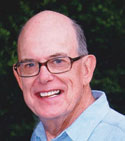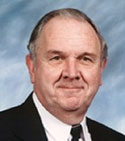Summer 2021
NSPE Today
In Memoriam
Jack Hinton, P.E., F.NSPE
September 8, 1936 – May 9, 2021
 Jack Hinton, P.E., F.NSPE, who served as NSPE president in 1996–97 passed away in Tulsa, Oklahoma, on May 9 at the age of 84.
Jack Hinton, P.E., F.NSPE, who served as NSPE president in 1996–97 passed away in Tulsa, Oklahoma, on May 9 at the age of 84.
During his presidency, Hinton championed NSPE’s role in the international practice of the profession, encouraged the development of a new licensure model, and called attention to engineering in industry.
Hinton was born in Mannford in northeastern Oklahoma and attended Oklahoma State University where he received a BS degree in electrical engineering in 1959. Following graduation, he went to work for Southwestern Bell Telephone Company, where he worked for his entire career before taking an early retirement in 1991. At the time of his retirement, he was managing 1,450 employees working in the engineering, construction, and maintenance of all facilities in Kansas.
In 1966, Hinton joined NSPE, and he was also a longtime member of the Kansas Society of Professional Engineers’ Topeka Chapter. He was honored with KSPE’s Engineer of the Year Award in 1990.
Not long before he was installed as NSPE president, international practice issues had become one of the profession’s top issues. In 1995, engineering leaders from the US, Canada, and Mexico celebrated a historic cross-border licensing agreement under the North American Free Trade Agreement, and Hinton didn’t want to see PEs left on the sideline. “The engineering profession is rapidly becoming international in scope,” Hinton wrote. “We in the U.S. must move rapidly and aggressively to take advantage of that development—or we will fall behind!”
Another priority during his presidency was advocacy for a new licensing system that would bring more engineers into the licensing pipeline while maintaining competency standards. “How well are we protecting the public if only one-fifth of engineers are licensed?” Hinton asked. A new model, endorsed by the NSPE Board of Directors in 1996, called for a nontechnical exam on ethics, codes, and standards as well as mandatory continuing education for license renewal, among other changes.
Hinton was also an advocate for preparing a new generation of engineers who could meet the changing needs of industry. At the time, industry characteristics like long-term jobs, hiring quotas not tied to immediate needs, and elaborate internal professional support systems were going out of style. And Hinton wanted to see young engineers prepared for this changing landscape.
“To be successful in the future, engineers must hone their communications and interpersonal skills. Recent engineering graduates are better equipped, technically, then in the past, but poor oral, written, and graphic communications abilities and people skills are the greatest cause of failure to advance,” Hinton wrote in Engineering Times. “Industry wants both technical and people skills. As they hire fewer graduates, they will look for those skills and leadership potential. Multilingual engineers will have an advantage in this era of global competition.”
Russel C. Jones, Ph.D., P.E., F.NSPE
 Former NSPE executive director Russel C. Jones, Ph.D., P.E., F.NSPE, who served as president of the Delaware Engineering Society and spent much of his career in academia, died on May 8 at the age of 85. He was an NSPE member for nearly 50 years.
Former NSPE executive director Russel C. Jones, Ph.D., P.E., F.NSPE, who served as president of the Delaware Engineering Society and spent much of his career in academia, died on May 8 at the age of 85. He was an NSPE member for nearly 50 years.
Born in Tarentum, Pennsylvania, near Pittsburgh, Jones earned bachelor’s, master’s, and doctoral degrees in civil engineering at the Carnegie Institute of Technology (later Carnegie Mellon University). After practicing as a civil engineer, he turned to education. He taught for eight years on the faculty of the Massachusetts Institute of Technology, followed by stints as chairman of civil engineering at Ohio State University, dean of engineering at the University of Massachusetts, academic vice president at Boston University, and president at the University of Delaware.
Within the engineering profession, Jones was a leader in many organizations. He served as NSPE executive director from 1995 to 1998, he was a national officer of the American Society of Civil Engineers, president of ABET, and a member of the Delaware Association of Professional Engineers, the state licensing board. He also chaired committees and task forces for the American Society for Engineering Education and the American Association of Engineering Societies.
Later in his career, Jones was most active in consulting on the enhancement of engineering education in developing countries. He also worked on volunteer activities in that area, such as president of the World Federation of Engineering Organizations Committee on Capacity Building, chair of the International Division of the American Society for Engineering Education, and as president of the Committee on Engineering Education of the Pan American Association of Engineering Societies.


